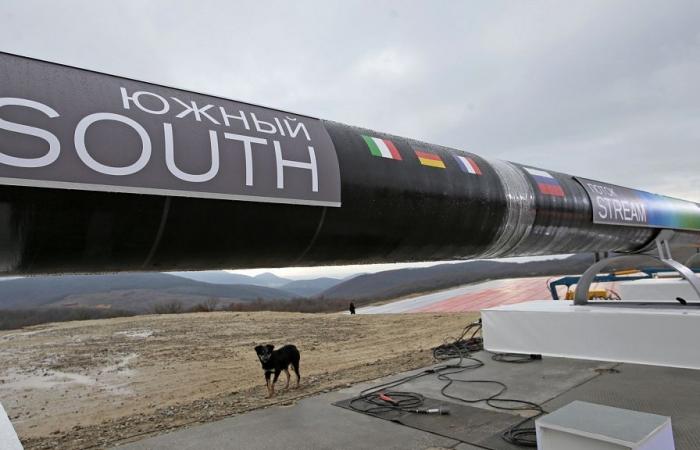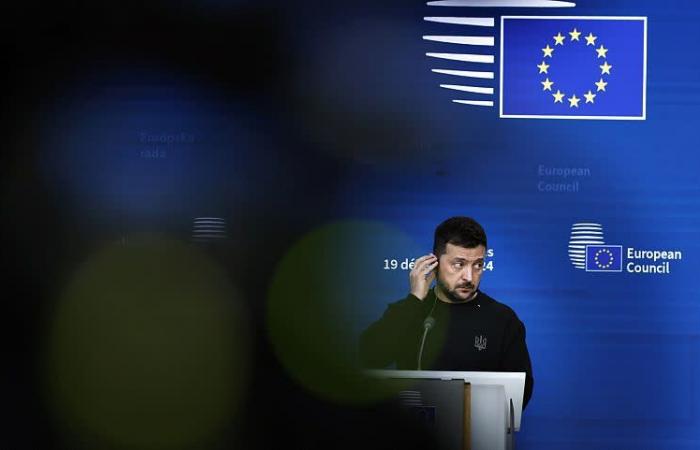Ukraine will no longer allow the transit of Russian gas through its territory after the end of this year, Volodymyr Zelensky announced after meeting European Union leaders in Brussels.
The ban, he added, will apply to any flow of gas “from Russia” in order to avoid the risk of seeing Russian gas sold to Europe under the cover of gas produced in Azerbaijan.
“We are not going to expand the transit of Russian gas,” Mr. Zelensky told reporters.
“We will not allow them to make additional billions off our backs. And any country in the world that can get something cheap from Russia will eventually become dependent on Russia – whether that happens in a month or in a year. an. This is their policy.”
This statement is unlikely to please Robert Fico, Prime Minister of Slovakia, a landlocked country that remains very dependent on the Russian gas pipeline.
Slovakia imports three billion cubic meters each year from Gazprom, the Russian gas monopoly, covering most of its domestic demand.
A major transit deal between Ukraine and Gazprom, from which Kyiv draws steady revenues, is set to expire at the end of this year. According to Bruegel, this agreement represents half of Russian gas exports by pipeline to the EU.
Although Russian gas exports by pipeline to the European Union have fallen since the invasion began, some supplies continue to flow unabated, free from sanctions.
With the end of the transit fast approaching, Slovakia has stepped up its diplomatic efforts to ensure that the country's energy flows are not interrupted.
As an alternative, Bratislava could resort to Azerbaijan, a small country in the Caucasus that has positioned itself as an affordable option for Europe to replace Russian gas. Deals with Azerbaijan are controversial due to the country's poor human rights record.
Under the project, Bruegel explains, Russia would supply gas to Ukraine under the name “Azerbaijani gas”, while Azerbaijan would purchase gas from Russia under the name “Russian gas” using the same infrastructure.
“Simply put, there would be no change in gas flows: EU traders would buy gas from Azerbaijan, which would buy gas from Russia,” Bruegel said in a study published in October.
Zelensky made clear, however, that he would not tolerate such a deceptive operation, arguing that the Kremlin would continue to make money and, therefore, retain a vital source of revenue to finance its costly and brutal invasion. He did not mention Azerbaijan by name, but the Financial Times reporter who asked the question did.
“We don't want to play a game where this other country receives gas from Russia and passes it through. That means continuing to profit from this war and sending money to Russia,” Zelensky said in his response.
The Ukrainian leader proposed an exception to the ban: Ukraine would allow the transit of Russian gas if the European buyer agreed not to pay Russia until the end of the war. However, this would most likely result in a breach of contract and a shutdown on the part of Gazprom.
“We will think about it,” he said. “But we don’t want to give Russia the opportunity to earn additional billions that would be invested in the war.”
Slovakia's main gas buyer, SPP, has warned that the loss of supplies from the East would cost an additional 150 million euros due to the tariff increase. According to Mr. Zelensky, Ukraine could also lose money by ending the transit of Russian gas. (Bruegel estimates this figure at 0.5% of GDP).
“To be honest, during the war it is a bit shameful to talk about money because we are losing people,” Mr. Zelensky said.
This news is expected to worsen ties between Kyiv and Bratislava.
Mr Zelensky and Mr Fico have had strained relations since the Slovak populist returned to power in October last year. Mr. Fico gradually aligned himself with Hungary's Viktor Orbán in adopting a deeply skeptical stance toward military support for Ukraine.
“Ukraine will not be invited to NATO. It will lose a third of its territory. There will be foreign military forces there,” declared Mr. Fico the day before the Brussels summit.
Slovakia is in contact with the Ukrainian government and the European Commission, which advocates the complete elimination of Russian gas, in order to find a solution before the transit agreement between Ukraine and Gazprom ends.
“We are having very intense discussions at the international level on gas supply in 2025,” Mr Fico said last week. “There are many obstacles, such as political statements from the Ukrainian side, pressure to suspend deliveries from the East to the West, proposals for much more expensive gas deliveries, including transit rights , which we reject. We see no reason to pay more for gas than necessary for geopolitical reasons.
Stopping the transit of Russian gas through Ukraine could also affect Austria and Hungary, although to a different extent. Earlier this month, Austrian company OMV ended its long-term contract with Gazprom after Russia cut off deliveries, an incident that Chancellor Karl Nehammer denounced as “blackmail.”







